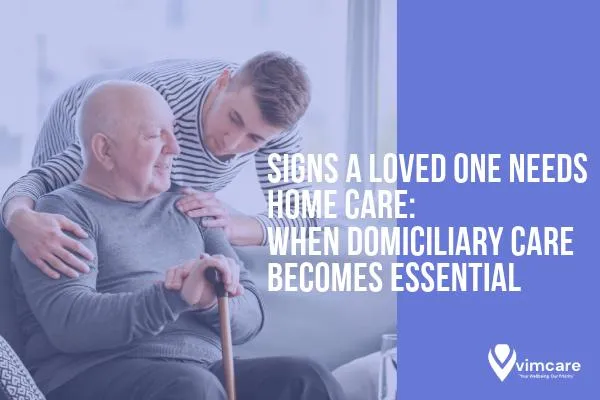
Signs a Loved One Needs Home Care: When Domiciliary Care Becomes Essential
Signs a Loved One Needs Home Care: When Domiciliary Care Becomes Essential
When you're close to someone—like a parent, grandparent, or spouse—it’s easy to overlook the subtle signs that they’re struggling. But as time goes on, even the smallest changes can signal that it might be time to consider domiciliary care, also known as home care or care in your own home.
In this blog, we’ll explore the early warning signs to watch for and how personalised home care can make a meaningful difference in your loved one's life.
What Is Domiciliary Care?
Before diving into the signs, let’s briefly cover what domiciliary care actually is.
Domiciliary care means receiving professional support in the comfort and familiarity of your own home. It can include personal care, medication reminders, help with household tasks, and even companionship. Unlike residential care, home care offers more flexibility, dignity, and continuity of lifestyle.
👉 Learn more: What Is Domiciliary Care and How Does It Work?
1. Changes in Personal Hygiene and Appearance
One of the earliest and most noticeable signs that your loved one may need care in their own home is a decline in personal hygiene.
Are they wearing the same clothes for days? Is their hair unkempt or are they skipping showers?
These changes could signal mobility issues, cognitive decline, or even depression—situations where home care support can step in to assist respectfully and discreetly.
Alt Text: Elderly woman brushing hair with caregiver helping – personal care in home setting
2. Poor Nutrition or Missed Meals
Check the fridge. Are there expired items or an absence of fresh food? Have they lost weight recently?
Meal preparation becomes more difficult with age or illness. A domiciliary care worker can assist with shopping, cooking, and even ensuring your loved one eats regularly.
👉 Related: Meal Preparation Support in Home Care
3. Increasing Forgetfulness or Confusion
We all forget things now and then, but if your loved one is missing appointments, repeating questions, or getting confused in familiar places, it could be time to talk about home care.
Cognitive decline, including early signs of dementia, can impact safety and wellbeing.
Alt Text: Care worker helping elderly man organise medication – memory support in home care
4. Unexplained Bruises or Injuries
Have you noticed cuts, bruises, or signs of falls? Many older adults underreport falls because they fear losing independence.
A fall doesn’t always mean a move to a care home—it could mean it’s time for a domiciliary care service to provide supervision, mobility support, and fall prevention at home.
👉 Read: How to Talk to Loved Ones About Home Care Support
5. Withdrawal from Social Activities
Isolation and loneliness are serious concerns. If your loved one no longer engages with friends or activities they once enjoyed, it could be due to physical limitations or emotional struggles.
Home care doesn’t just mean physical help—it also includes companionship and emotional support.
Alt Text: Smiling carer having tea with elderly man – companionship through domiciliary care
6. Neglected Household Tasks
Is the house messier than usual? Are bills unpaid or post piling up?
These might seem small, but they can reflect declining executive function or physical ability. A home care assistant can help manage day-to-day tasks to keep the home safe and comfortable.
👉 Explore: What to Look for in a Domiciliary Care Provider
7. Changes in Mood or Behaviour
Mood swings, irritability, or signs of depression could indicate your loved one is struggling silently.
Support from home care professionals can help identify root causes and offer companionship, medication reminders, or a bridge to medical attention if needed.
8. Trouble Managing Medication
Medication routines can be complex—especially for those with multiple prescriptions.
If you find pills out of order, unfilled prescriptions, or confusion around dosage, a domiciliary care provider can assist with safe and accurate medication management.
👉 NHS Guide: Help with Medication at Home
9. Caregiver Burnout
Sometimes the signs don’t just come from the person receiving care—it’s also about you.
If you’re feeling physically or emotionally overwhelmed, it might be time to bring in home care professionals to support both your loved one and yourself.
👉 Related: The Care Conversation Every Family Must Have
What to Do If You Notice These Signs
The first step is not panic—it’s a conversation. Start gently. Bring up what you’ve noticed with love and concern, not judgment. Involve other family members and, if possible, consult your GP or local authority for a care needs assessment.
A provider like Vim Care Limited can also carry out a free home assessment to see how we can help tailor support to your loved one’s needs.
Summary
Here’s a quick recap of signs that might indicate it’s time for domiciliary care:
Declining personal hygiene or appearance
Missed meals or weight loss
Memory problems or confusion
Frequent falls or unexplained injuries
Withdrawing from social contact
Household neglect
Mood or behaviour changes
Trouble with medication
Burnout from family caregiving
Recognising these signs early can make all the difference. Home care can help your loved one stay safe, supported, and happy—right where they want to be.
To Speak to an Expert
Take our Free Care Needs Assessment to help us create a personalised session just for you. Whether you’re exploring care options for yourself or a loved one, we’ll focus on your unique challenges and goals.
It takes less than 2 minutes
It’s completely free.
Unlock tailored advice and a personalised care plan instantly.
BOOK FREE 1 - 1 CONSULTATION NOW
Get in Touch
📞 Contact us at 07770428012
📧 Email us at [email protected]
🌐 www.vimcarelimited.com
